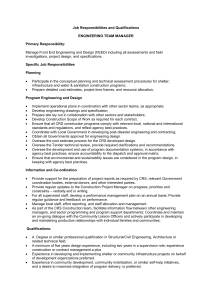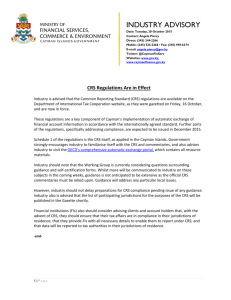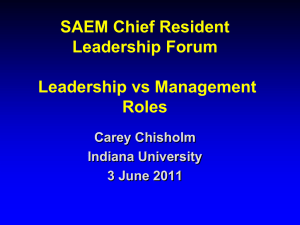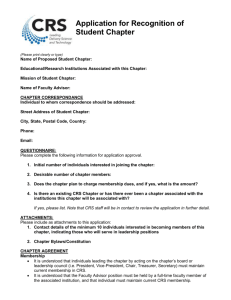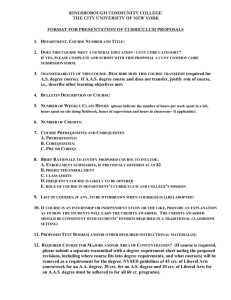Northumbria University Action Plan RCUK Concordat to Support the
advertisement
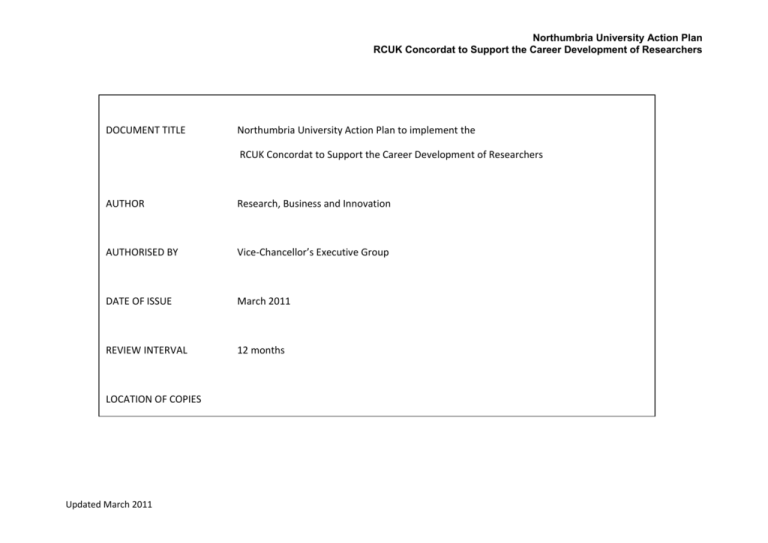
Northumbria University Action Plan RCUK Concordat to Support the Career Development of Researchers DOCUMENT TITLE Northumbria University Action Plan to implement the RCUK Concordat to Support the Career Development of Researchers AUTHOR Research, Business and Innovation AUTHORISED BY Vice-Chancellor’s Executive Group DATE OF ISSUE March 2011 REVIEW INTERVAL 12 months LOCATION OF COPIES Updated March 2011 Northumbria University Action Plan RCUK Concordat to Support the Career Development of Researchers Introduction Northumbria University is committed to the principles of the Concordat to Support the Career Development of Researchers (‘the Concordat’), an agreement between Research Councils UK and UK universities. A gap analysis was conducted in 2008-2009, in which the views of Deans and Associate Deans for Research from all Schools were obtained to enable the University to identify areas requiring development. These are outlined in the action plan below. In parallel to the work on the Concordat, the University undertook a wider review of academic provision and service support, in order to improve the academic development of early career research staff. Structures and committees A dedicated working group, led by the DVC (Research and Innovation), was set up to oversee the implementation of the Concordat. This group reports to the University Research and Innovation Committee, which in turn reports to Academic Board. The working group includes representation from research and academic staff from all eight Schools in the University (both at Dean/Associate Dean Research level and early career researchers/contract research staff), as well as key representatives from Human Resources (HR) and Research, Business and Innovation (RBI), charged with supporting the implementation of the Concordat. The group is thus broadly representative of the University’s research community and able to take account of a broad range of interests and perspectives. The University Research and Innovation Committee has a broad range of membership which includes representation from all Schools and from research staff across the career spectrum. The PGR student community is also represented. It is expected that members will act as conduits both to represent a broad range of interests and opinions at meetings and to cascade Committee decisions and discussions back to their colleagues. The University Research and Innovation Committee has responsibility for overseeing implementation of the Concordat across the University. The Committee will review progress against the action plan. It is anticipated that further development work will be identified when results are available from two national surveys in which the University will participate in May 2011 (the Careers in Research Online Survey and the Principal Investigators and Research Leaders Survey). The data generated from these surveys will be analysed carefully and reported to the University Research and Innovation Committee for scrutiny. It is expected that the action plan will be augmented and extended as a result of this exercise. Updated March 2011 Northumbria University Action Plan RCUK Concordat to Support the Career Development of Researchers Action Concordat Responsibility Principle Completion date 1. Develop role profiles for researchers 1, 2, 4, 5 a. Development of guideline person specifications and exemplar job descriptions for contract research roles (grades 4-7),in line with Higher Education Role Analysis (HERA), to clarify the knowledge, skills and abilities required at each grade to ensure Principal Investigators (PIs) hire staff with the appropriate skills in relation to their grade. b. Development of career development framework (based on Vitae Researcher Development Framework) to identify the competencies required for subsequent grades. Benefits: Role profiles will lead to improvements in the development of Schools’ job descriptions and person specifications. This initiative will facilitate high quality objective recruitment This initiative will support PIs in the development of Personal Development Plans (PDPs) for contract research staff (CRS). This work will provide a basis for all PDP/mentoring activity with Updated March 2011 1a. Geoff Foster (HR) July 2011 1b. Lesley Lee and Stephanie Bales (HR/RBI) July 2011 Northumbria University Action Plan RCUK Concordat to Support the Career Development of Researchers CRS. 2. Review practices around redeployment of staff on fixed-terms contracts to include: 2 a. Identification of follow on funding for projects 6mths-1yr before the project end date. b. Identification to PIs and to Schools of suitable CRS candidates approaching the end of their contracts for any new posts created. c. Identification of permanent employment opportunities for CRS redeployment. d. Support CRS through PDPs to develop the necessary skills and experience to enable progression in to a permanent opportunity. 2a. Stephanie Bales (RBI) April 2011 2b-2c Geoff Foster (HR) July 2011 2d ADRs / Deans Benefits: The University will benefit from staff with research training, qualifications and /or experience applying for first permanent academic posts. The schools and PIs will identify future funding opportunities at an early stage. 3. Training and development for research mentors and managers (PIs) combined with awareness-raising among target audience a. Development of a ‘Northumbria Research Staff Management Principles’ document, in line with the Concordat, to clarify roles and responsibilities for all PIs and line managers around the areas of: recruitment; induction; requirements for feedback and career development advice; personal development planning of CRS; training and career development; opportunities to enable staff to acquire and develop key skills and performance management. b. RBI/HR staff to attend all School Research Committees to promote Updated March 2011 2 3a Geoff Foster/HR July 2011 Managers/Stephanie Bales (HR/RBI) 3b Stephanie Bales/Geoff Foster (RBI/HR) Northumbria University Action Plan RCUK Concordat to Support the Career Development of Researchers c. d. e. f. g. principles and PI responsibilities Role profiles document to be promoted on staff research pages of the Northumbria website and be sent to all PIs on receipt of a new award. Development of a mentoring scheme across the University. Development of People management/Project management skills for PIs. Invitations to all current PIs to attend Project Management/People Management training. Creation of opportunities for CRS to engage with both commissioners and users of research 3c Geoff Foster/HR Managers/Stephanie Bales (HR/RBI) 3d-f Lesley Lee/Stephanie Bales (HR/RBI) 3g Stephanie Bales (RBI) Benefits: Research Managers will be aware of their responsibilities to CRS, particularly around performance management and career development. 4. Conduct the Careers in Research Online Survey 4 Stephanie Bales (RBI) May 2011 Lesley Lee and Stephanie Bales (HR/RBI) July 2011 Benefits: The University will gain insight into the experiences of CRS at Northumbria The University will be able to benchmark its position in terms of support for CRS against other HEIs in the sector and its benchmark group. 5. Review of the University Induction Process to include CRS-specific 3,4,5 elements a. that specifically address continuing professional development through the early identification of a mentor and development of a PDP for CRS b. that identify opportunities on the University Research Staff Training Programme c. that identify and signpost CRS to relevant research policies and Updated March 2011 Northumbria University Action Plan RCUK Concordat to Support the Career Development of Researchers procedures on the University website Benefits: CRS will be enabled to manage their own research careers and be made aware of appropriate training. 6. Offer places on the research staff training elements of the Early Career Development programme in Academic Practice to all CRS. 2,3,4 Lesley Lee and Stephanie Bales (HR/RBI) Sept 2011 4 Stephanie Bales (RBI) May 2011 6 Joanne Colvin (HR) July 2011 Benefits: CRS will be assigned a mentor to support the development of their research skills, knowledge and experience. CRS will develop the skills necessary for an academic post at Northumbria. 7. Ensure CRS are represented on all School Research and Innovation Committees in line with the University Research and Innovation Committee terms of reference. Benefits: Ensure CRS issues are represented and considered at all School Research and Innovation Committees. 8. Promote equality and diversity in recruitment and career management of CRS a. Investigate membership of Athena SWAN charter (seek Updated March 2011 Northumbria University Action Plan RCUK Concordat to Support the Career Development of Researchers membership of charter at bronze level with a view to assessing whether and how to pursue further levels of membership). b. Investigate sector opportunities and initiatives aimed at promoting diversity in research careers. c. Equality and Diversity policy to be reflected in recruitment and selection practice to ensure appropriate representation on appointment panels. Benefits: Will promote diversity in researcher profile of University and research careers. Updated March 2011
